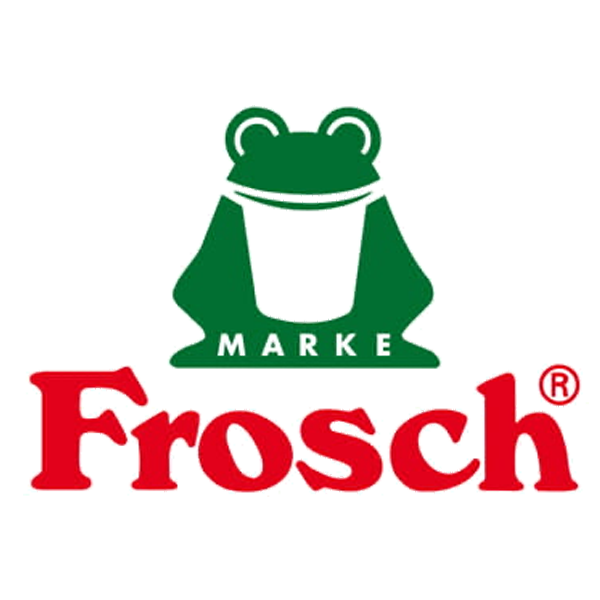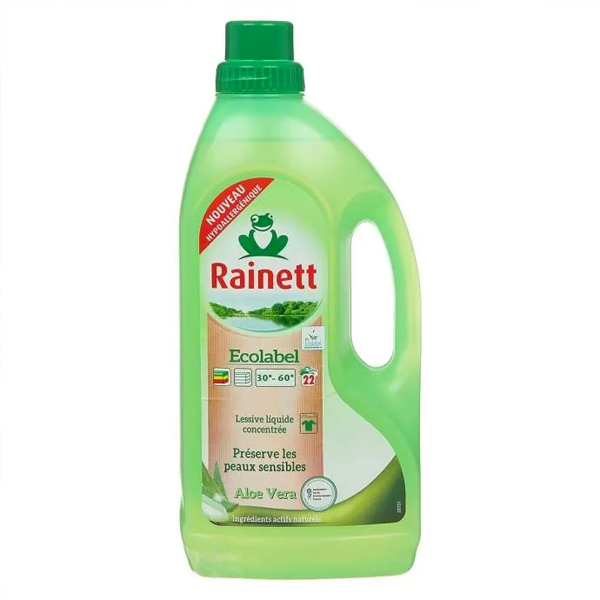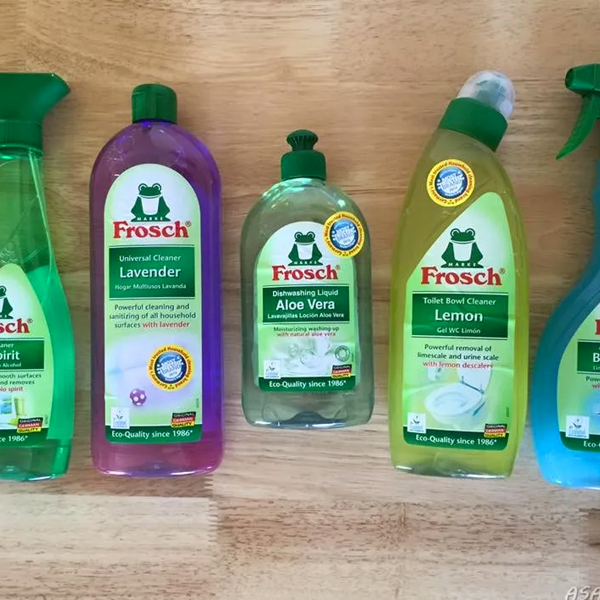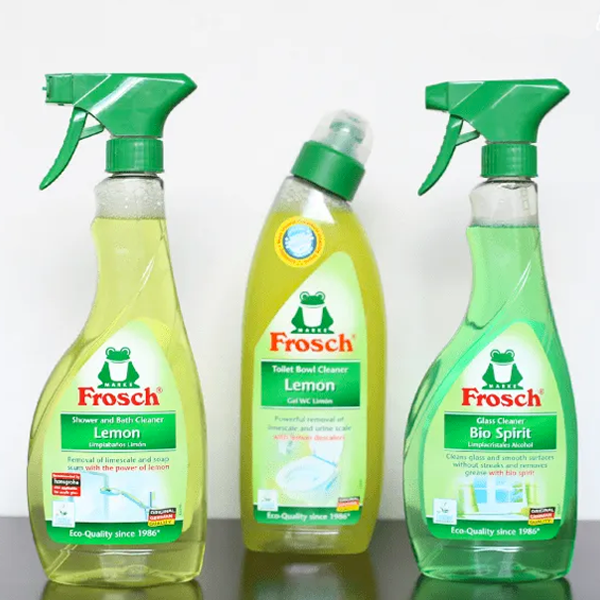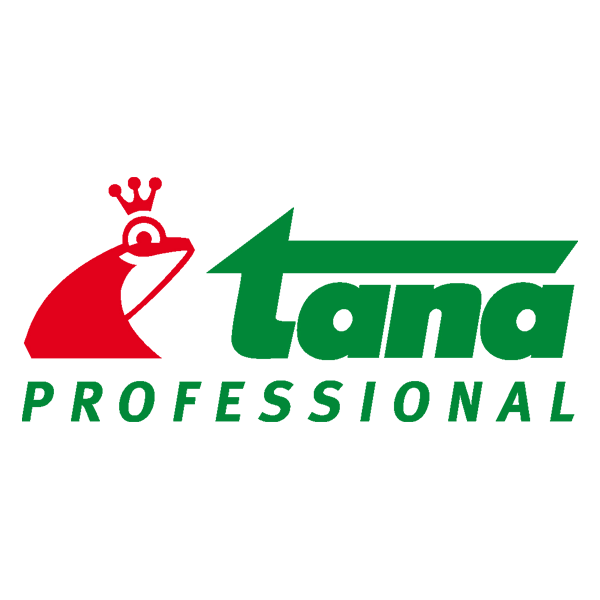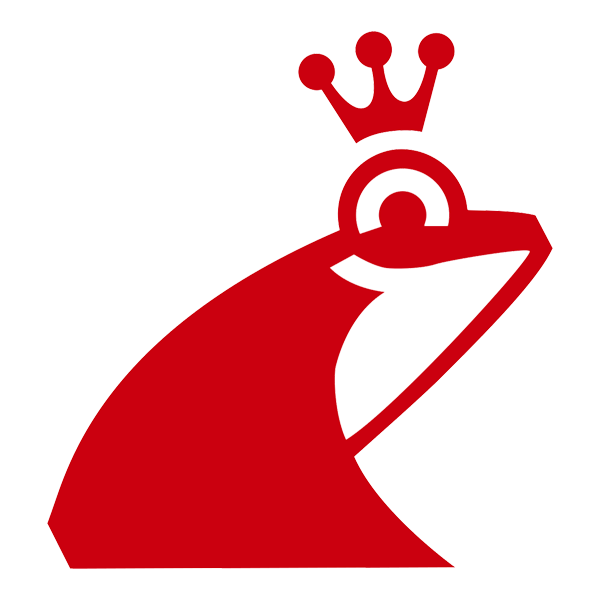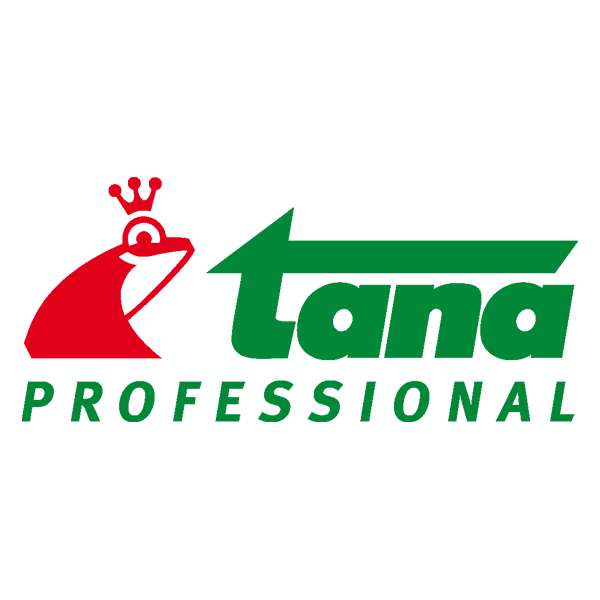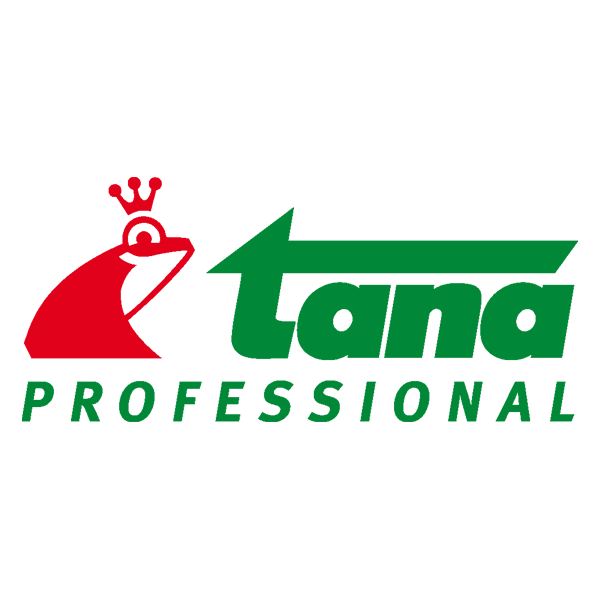Certificates:
-
C2C Certified Material Health Certificate™ PLATINUM
-
C2C Certified® GOLD
The Frosch Rainett Lemon Shower & Bathroom Cleaner is designed to remove dirt and lime in the shower area and in the entire bathroom. Its Natural Force-Formula with citric acid is designed to remove water stains, soap residuals, dirt, and lime incrustations. Additionally, the product is designed to eliminate unpleasant odors and leave a fruity-fresh scent.
The Frosch Rainett Lavender Hygiene Bathroom-Cleaner is designed to remove dirt and lime in the bathroom. Its NaturalForce-Formula with lavender extracts is designed to remove water stains, soap residuals, dirt, and lime incrustations. Additionally, the product is designed to eliminate odors and leave a fresh lavender scent.
The Frosch Rainett Spirit Glass-Cleaner is designed to remove dust and dirt from all glass surfaces. Its NaturalForce-Formula is suitable for cleaning nearly all surfaces. The product is designed to leave a pleasant scent.
This certificate covers the following products:
Frosch / RainettLemon + Lavender Bathroom, Frosch Citrus Dusche und Bad-Reiniger, Frosch Lavendel Hygiene-Reiniger, Frosch Spiritus Glas-Reiniger
About Werner & Mertz: With brands such as Erdal, Frosch and tana, Werner & Mertz is well established as an innovative company on the European market. The principles of an environmentally friendly and sustainable way of doing business are also not new to the company. The term "sustainability" is not a fad there, but a living company tradition.
For 140 years, the name Werner & Mertz has stood for competence and experience in the areas of cleaning, care and value retention.
Case Study
Frosch: Cyclable Flexible Packaging Pouch
Cyclable Flexible Packaging Pouch now available in retail markets in Germany.
The first completely recyclable stand-up pouch, which won in the Sustainability category, is now on retail shelves. Soon the entire pouch portfolio for the Frosch brand will be converted to the new packaging.The innovation challenge: To develop a fully recyclable, all-polyethylene, stand-up pouch for the German cleaning brand „Frosch“. It took some time and quite some effort, but the result is a real milestone for the packaging industry. The resulting flexible pouch uses 70 % less material than its rigid bottle counterpart and is designed for a closed loop circular economy. The patented pioneering design overcomes many shortcomings of the recycling process and is the result of a joint consortium effort which started in 2015 by Werner & Mertz (Frosch), Mondi, EPEA Switzerland (Cradle to Cradle®), Der Grüne Punkt – Duales System Deutschland and Institut cyclos-HTP.
You can find out more about this product on the company website.
Additionally, at EPEA Switzerland we have been very active in research, documentation and publication of topic-related knowledge. Attached are some selected articles from the last years.
Case Study
Werner & Mertz – From linear to circular
Conventional management systems were developed for companies with linear structures. This means they are to some extent at odds with the principles of a circular economy. EPEA Switzerland and Werner & Mertz are working to reconcile the two approaches.
Management systems are intended to give companies structure and consequently make business processes optimally efficient. The same is true of environmental management systems certified to ISO 14001, for example. These already focus on environmental aspects in the life cycle perspective and the identification of potential opportunities and risks.
However, they still relate to companies with a linear structure and therefore do not incorporate the principles of a circular economy, such as Cradle to Cradle. This is now set to change through the work of the German family-run company Werner & Mertz, famous for its “Frosch” (frog) brand of professional and household cleaning supplies, and EPEA Switzerland, the accredited assessment body for the Cradle to Cradle Certified certification standard and Material Health Certification. They intend to develop management systems for companies structured for the circular economy.
A key step has been taken by Werner & Mertz with the launch of the “green care PROFESSIONAL” brand for the professional institutional and industrial sector. This brings together the principles of a management system that correctly implements processes with the principles of implementing the right processes under Cradle to Cradle in one principle that ensures the right processes are implemented correctly. Werner & Mertz has already been working towards this aim with its Frosch and green care PROFESSIONAL product ranges.
A further success on the road to combining linear management systems with the circular economy was achieved by EPEA Switzerland at the end of 2019. It entered into a cooperation agreement with the certification body Quality Austria to further align environmental management and circular economy systems. Now, EPEA Switzerland and Quality Austria plan to also exploit the potential offered by the European Union’s European Green Deal. This set of policy initiatives by the European Commission is a roadmap for making the EU’s economy sustainable.
Werner & Mertz are already operating with this in mind. „Only by shifting sustainability center stage in all its processes can a company effectively make and sell an eco-friendly product„, says Reinhard Schneider, CEO of Werner & Mertz.
Case Study
OceanSafe and Werner & Mertz named winner of the German Sustainability Award
OceanSafe has been named among the winners of the German Sustainability Award Design. The company impressed with its modular construction system for the textiles industry that complies with the principles of the circular economy and is Cradle to Cradle Certified™ GOLD. Also, among the winners was Werner & Mertz for their packaging “Recyclate Initiative”. EPEA Switzerland congratulates OceanSafe and Werner & Mertz for this honor and achievement. Both companies carry Cradle to Cradle Certified™ GOLD certificates and are lighthouses for the circular economy.
Recyclable packaging from Frosch
The “Recyclate Initiative” founded by Werner & Mertz (W&M) in 2012 has impressively proven that branded packaging can be made from old plastic from the yellow bag. And not only for detergents, cleaning agents and cleaning agents, but for the first time also for cosmetics (shower gels). This is made possible by the high-quality processing of recycled material, which is then repeatedly available for new packaging. There is no comparable high-quality recycling of household-type mixed collected plastic packaging anywhere in the world.
This made W&M a recycling pioneer and rightly communicates this openly on its packaging and in TV advertising. So far, more than 400 million bottles made from 100 percent old plastic have been brought onto the market as part of the initiative. This gives reason to hope that in future the entry of plastic into the environment will be noticeably reduced, since plastic waste is given value.
Press release Werner & Mertz
Website Werner & Mertz Professional
OceanSafe, Textiles Next Generation
The modular system developed by OceanSafe enables the textile industry to manufacture environmentally friendly products with Cradle to Cradle Certified™ Gold certification. While many conventional textiles release microplastics during washing and thus pollute the water, the washed-out microfibres from the OceanSafe construction kit are safe for biological cycles. Part of the circular concept is that the disused textiles are taken back by the sales partners and sent to industrial composting, which also reduces waste. With 18 different yarns, the remarkably wide and high-quality range of the modular system includes both synthetic and natural fibers, including a newly developed and patented fiber that is rapidly biodegradable and yet permanently flame retardant. There are also suitable dyes and additives, all of which are also safe for the biological cycle. 20 to 30 percent of the amount of microplastics in water are coming from textiles. With the clever modular system from OceanSafe, the industry has an attractive opportunity to change this situation.
Press release OceanSafe (German)
Website OceanSafe
Case Study
Cradle-to-Cradle revolutionizing the printing industry
Bäch SZ – UV printing inks have already influenced the printing industry to a significant extent. However, it is only following a collaboration between Werner & Mertz, Siegwerk Druckfarben and EPEA Switzerland that these inks have also become compatible with the circular economy.
Werner & Mertz, the German company of brands for detergents, care products and cleaning products, has been working with EPEA Switzerland, the accredited expert for Cradle-to-Cradle Certified and Material Health Certificate certifications, as partners for eight years already. Together, the two organizations have developed to market maturity several innovations that are compatible with the principles of the circular economy. When Werner & Mertz and EPEA Switzerland decided to create UV printing inks in accordance with the Cradle-to-Cradle circular economy principles a few years ago, Siegwerk Druckfarben was their first port of call. Together, the three partners resolved in 2016 to sustainably transform the printing industry.
UV printing inks can be printed onto numerous surfaces as well as on paper. They are therefore well-suited to being used for all types of packaging. The inks set hard immediately after being exposed to UV light. For this reason, they do not need to be bound with the material on which they are printed. However, the pigments in UV printing inks could not be recycled until the revolutionary collaboration of these three partners. In order to change this, Werner & Mertz and Siegwerk consistently worked on a project to develop UV printing inks that firstly complied with the Cradle-to-Cradle requirements and secondly achieved the required level of print quality. It is not just the pigments themselves that are responsible for this, as Immo Sander, who advanced this development at Werner & Mertz, explains. It is rather more a case of ensuring an effective overall interaction between the printing ink in question and the surface to be printed.
Nevertheless, their experiments were successful and eventually led to a breakthrough, EPEA Switzerland founder and CEO Albin Kälin says. The developed UV offset colors were awarded the Material Health Certificate GOLD and are today the only Cradle-to-Cradle certified UV ink system with gold status. The certification represents another step in the right direction, comments Alina Marm, Head of Circular Economy Hubs at Siegwerk Druckfarben. As a family company with 190 years of history, the printing ink manufacturers see it as their responsibility towards future generations to constantly further improve the ecological footprint and thereby proactively advance the compatibility of packaging formats with the circular economy.
Case Study
Werner & Mertz – From linear to circular
Conventional management systems were developed for companies with linear structures. This means they are to some extent at odds with the principles of a circular economy. EPEA Switzerland and Werner & Mertz are working to reconcile the two approaches.
Management systems are intended to give companies structure and consequently make business processes optimally efficient. The same is true of environmental management systems certified to ISO 14001, for example. These already focus on environmental aspects in the life cycle perspective and the identification of potential opportunities and risks.
However, they still relate to companies with a linear structure and therefore do not incorporate the principles of a circular economy, such as Cradle to Cradle. This is now set to change through the work of the German family-run company Werner & Mertz, famous for its “Frosch” (frog) brand of professional and household cleaning supplies, and EPEA Switzerland, the accredited assessment body for the Cradle to Cradle Certified certification standard and Material Health Certification. They intend to develop management systems for companies structured for the circular economy.
A key step has been taken by Werner & Mertz with the launch of the “green care PROFESSIONAL” brand for the professional institutional and industrial sector. This brings together the principles of a management system that correctly implements processes with the principles of implementing the right processes under Cradle to Cradle in one principle that ensures the right processes are implemented correctly. Werner & Mertz has already been working towards this aim with its Frosch and green care PROFESSIONAL product ranges.
A further success on the road to combining linear management systems with the circular economy was achieved by EPEA Switzerland at the end of 2019. It entered into a cooperation agreement with the certification body Quality Austria to further align environmental management and circular economy systems. Now, EPEA Switzerland and Quality Austria plan to also exploit the potential offered by the European Union’s European Green Deal. This set of policy initiatives by the European Commission is a roadmap for making the EU’s economy sustainable.
Werner & Mertz are already operating with this in mind. „Only by shifting sustainability center stage in all its processes can a company effectively make and sell an eco-friendly product„, says Reinhard Schneider, CEO of Werner & Mertz.
